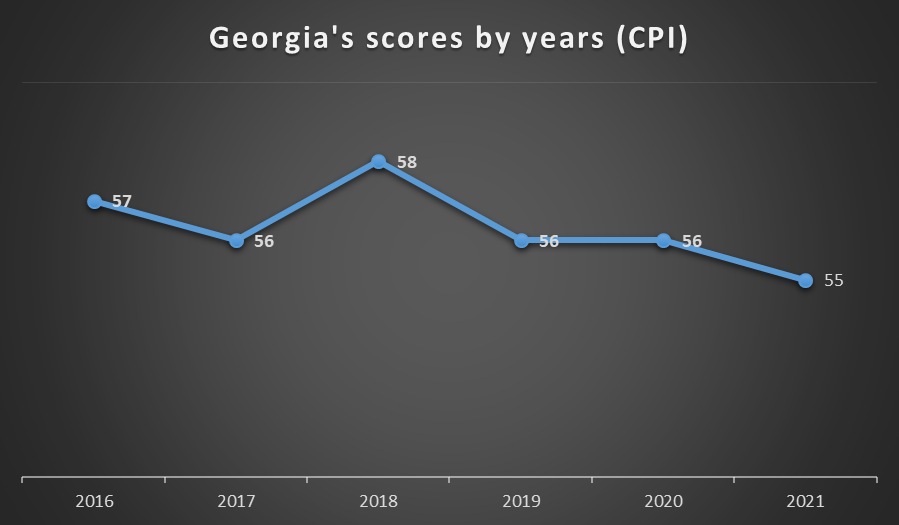


Transparency International published Corruption Perception Index (CPI) 2021 results on January 25th. According to the report Georgia was ranked 45th among 180 countries with the score of 55. Georgia has worsened its results in the index compared to the previous years. While Georgia remains a leader in the Eastern Europe and Central Asia Region, it has moved four steps backward in international ranking over the past four years. In 2020 Georgia was ranked 45th among 180 countries with the score of 56, in 2019 - 44th with the score of 56, and in 2018 Georgia was on the 41st place with the score 58.

Corruption Perceptions Index aggregates data from a number of different sources that provide perceptions by business people and country experts of the level of corruption in the public sector. The CPI uses a scale from 0 to 100 where 100 is very clean and 0 is highly corrupt. As of 2021, the average score is 43 and the average regional score for Eastern Europe and Central Asia is 36.
The best results have been acquired and thus, top ten countries in the world according to the CPI are Denmark, Finland, New Zealand, Norway, Singapore, Sweden, Switzerland, the Netherlands, Luxembourg, and Germany.
It is noteworthy that in 2021 Georgia was mentioned in the rankings of several international organizations. Most of them indicate that corruption situation in the country is worsening. Although Georgia has succeeded in fighting petty corruption, high-level corruption involving officials in the country remains a problem. This also is indicated by the fact that Georgia’s result in the Corruption Perception Index has not been improved significantly over the years. The score received by Georgia in 2021 within the Index is the lowest score given to the country since 2015.
Considering this, hindering the OECD/ACN report on Anti-Corruption environment by the Government of Georgia is particularly alarming. Herewith, it has to be mentioned that Georgia’s implementation of Anti-Corruption recommendations issued by international organizations is characterized by low progress that clearly indicates a transition to a passive phase in the fight against corruption in the country. Unfortunately, the National Anti-Corruption Council has not been assembled, the Secretariat of the Anti-Corruption Council actually does not exist, national Anti-Corruption Action Plan for 2021 – 2022 has not been developed. This practice, together with Anti-Corruption indicators shows that pursuing an effective Anti-Corruption policy is no longer a priority in the country.
In order to respond the existing challenges, it is important for Georgia to renew the functioning of the Anti-Corruption Council, to adhere to the recommendations of international Anti-Corruption institutions, to pay more attention to the fight against corruption, to take into consideration the challenges identified in these areas, develop effective policy documents in a timely manner and undertake ambitious commitments within these strategic documents to make relevant changes.
IDFI once again emphasizes that the independence of state agencies tasked with combating corruption is one of the most important standards, which ensures the effectiveness of combating corruption, accountability, high level of transparency and, therefore, high level of public trust. However, the analysis of the practice of combating corruption in Georgia shows that the independence of the agencies fighting against corruption is the most challenging.
Therefore, IDFI considers it necessary to create an Independent Anti-Corruption Agency equipped with high degree of independence, relevant power and public trust to investigate high-level corruption cases and answer all the legitimate questions.

This material has been financed by the Swedish International Development Cooperation Agency, Sida. Responsibility for the content rests entirely with the creator. Sida does not necessarily share the expressed views and interpretations.